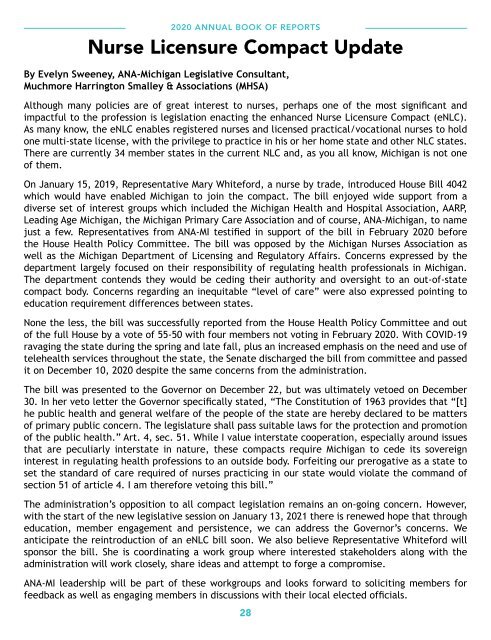ANA-Michigan - 2020 Annual Book of Reports
Create successful ePaper yourself
Turn your PDF publications into a flip-book with our unique Google optimized e-Paper software.
<strong>2020</strong> ANNUAL BOOK OF REPORTS<br />
Nurse Licensure Compact Update<br />
By Evelyn Sweeney, <strong>ANA</strong>-<strong>Michigan</strong> Legislative Consultant,<br />
Muchmore Harrington Smalley & Associations (MHSA)<br />
Although many policies are <strong>of</strong> great interest to nurses, perhaps one <strong>of</strong> the most significant and<br />
impactful to the pr<strong>of</strong>ession is legislation enacting the enhanced Nurse Licensure Compact (eNLC).<br />
As many know, the eNLC enables registered nurses and licensed practical/vocational nurses to hold<br />
one multi-state license, with the privilege to practice in his or her home state and other NLC states.<br />
There are currently 34 member states in the current NLC and, as you all know, <strong>Michigan</strong> is not one<br />
<strong>of</strong> them.<br />
On January 15, 2019, Representative Mary Whiteford, a nurse by trade, introduced House Bill 4042<br />
which would have enabled <strong>Michigan</strong> to join the compact. The bill enjoyed wide support from a<br />
diverse set <strong>of</strong> interest groups which included the <strong>Michigan</strong> Health and Hospital Association, AARP,<br />
Leading Age <strong>Michigan</strong>, the <strong>Michigan</strong> Primary Care Association and <strong>of</strong> course, <strong>ANA</strong>-<strong>Michigan</strong>, to name<br />
just a few. Representatives from <strong>ANA</strong>-MI testified in support <strong>of</strong> the bill in February <strong>2020</strong> before<br />
the House Health Policy Committee. The bill was opposed by the <strong>Michigan</strong> Nurses Association as<br />
well as the <strong>Michigan</strong> Department <strong>of</strong> Licensing and Regulatory Affairs. Concerns expressed by the<br />
department largely focused on their responsibility <strong>of</strong> regulating health pr<strong>of</strong>essionals in <strong>Michigan</strong>.<br />
The department contends they would be ceding their authority and oversight to an out-<strong>of</strong>-state<br />
compact body. Concerns regarding an inequitable “level <strong>of</strong> care” were also expressed pointing to<br />
education requirement differences between states.<br />
None the less, the bill was successfully reported from the House Health Policy Committee and out<br />
<strong>of</strong> the full House by a vote <strong>of</strong> 55-50 with four members not voting in February <strong>2020</strong>. With COVID-19<br />
ravaging the state during the spring and late fall, plus an increased emphasis on the need and use <strong>of</strong><br />
telehealth services throughout the state, the Senate discharged the bill from committee and passed<br />
it on December 10, <strong>2020</strong> despite the same concerns from the administration.<br />
The bill was presented to the Governor on December 22, but was ultimately vetoed on December<br />
30. In her veto letter the Governor specifically stated, “The Constitution <strong>of</strong> 1963 provides that “[t]<br />
he public health and general welfare <strong>of</strong> the people <strong>of</strong> the state are hereby declared to be matters<br />
<strong>of</strong> primary public concern. The legislature shall pass suitable laws for the protection and promotion<br />
<strong>of</strong> the public health.” Art. 4, sec. 51. While I value interstate cooperation, especially around issues<br />
that are peculiarly interstate in nature, these compacts require <strong>Michigan</strong> to cede its sovereign<br />
interest in regulating health pr<strong>of</strong>essions to an outside body. Forfeiting our prerogative as a state to<br />
set the standard <strong>of</strong> care required <strong>of</strong> nurses practicing in our state would violate the command <strong>of</strong><br />
section 51 <strong>of</strong> article 4. I am therefore vetoing this bill.”<br />
The administration’s opposition to all compact legislation remains an on-going concern. However,<br />
with the start <strong>of</strong> the new legislative session on January 13, 2021 there is renewed hope that through<br />
education, member engagement and persistence, we can address the Governor’s concerns. We<br />
anticipate the reintroduction <strong>of</strong> an eNLC bill soon. We also believe Representative Whiteford will<br />
sponsor the bill. She is coordinating a work group where interested stakeholders along with the<br />
administration will work closely, share ideas and attempt to forge a compromise.<br />
<strong>ANA</strong>-MI leadership will be part <strong>of</strong> these workgroups and looks forward to soliciting members for<br />
feedback as well as engaging members in discussions with their local elected <strong>of</strong>ficials.<br />
28

















